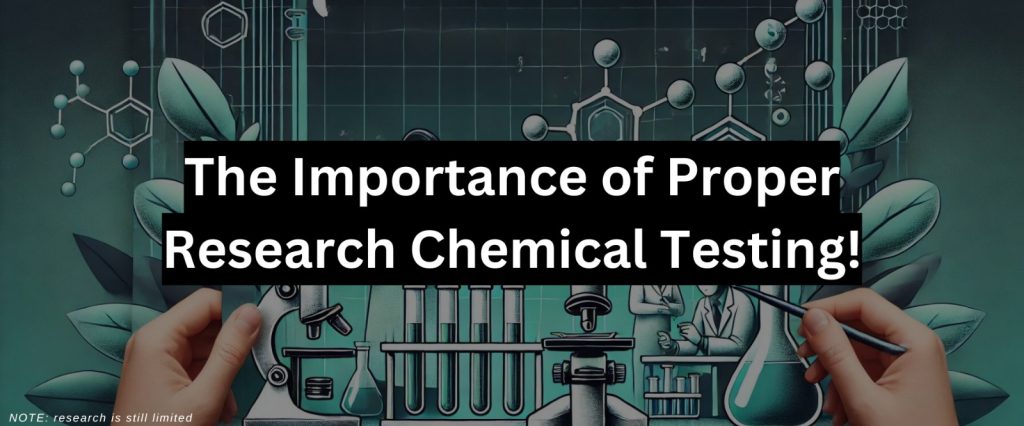HPLC Testing: The Best Way To Know If Your Peptides Are Legit! (October 2024)
In this article we will dive into
- What HPLC Testing Is
- Why It is So Important
- How HPLC Testing Works
- Why You Should Only Shop From Vendors with This Testing
And more!

The Importance of HPLC Testing for Peptides: Ensuring Quality and Integrity in Research Compounds
In the world of research chemicals and peptides, product quality is paramount. The efficacy and safety of peptides depend heavily on their purity and composition.
While other factors like online reviews and what not can be helpful they can often sometimes be misleading or not give the full story.
HPLC testing helps to ensure you get the hard facts on your research chemicals.
However, many companies neglect to rigorously test their products, often leading to compromised quality, ineffective research results, and potential safety issues.
High-Performance Liquid Chromatography (HPLC) testing is one of the most reliable methods to ensure peptide purity, offering researchers confidence in the compounds they use.
This article will dive into why HPLC testing is critical, how it distinguishes high-quality research companies from others, and how the process works to guarantee the best possible products.
Why HPLC Testing is Crucial for Peptides
Peptides are delicate chains of amino acids that can easily be contaminated or synthesized incorrectly if proper measures aren’t taken.
Without adequate testing, the purity and concentration of these peptides can vary widely, leading to unpredictable results in research settings.
Unfortunately, many companies bypass proper quality control due to the time and expense involved, flooding the market with subpar products.
Substandard peptides often contain impurities, incorrect amino acid sequences, or lower concentrations than what’s labeled.
These inconsistencies can not only jeopardize the accuracy of research but also lead to unexpected side effects, undermining the credibility of research findings.
HPLC testing becomes essential in this context because it provides a reliable method for verifying that peptides are exactly what they claim to be.
Research companies that invest in HPLC testing demonstrate their commitment to quality, ensuring that their products are safe, consistent, and effective.
This sets them apart from less scrupulous companies that cut corners, making them the preferred choice for serious researchers.
Reflecting a Better Research Company: The Role of HPLC Testing
When a company offers HPLC-tested peptides, they signal their dedication to quality control, transparency, and scientific integrity.
This type of testing is not an industry standard among all research chemical suppliers, making it a distinguishing factor for companies that prioritize long-term trust over short-term profits.
For researchers, using peptides that have undergone HPLC testing ensures confidence in their experimental data, knowing that their results will not be skewed by impure or misrepresented compounds.
It also reflects the professionalism and ethics of the research company itself, indicating that they care about providing accurate, reliable products that meet stringent scientific standards.
Research companies that perform HPLC testing can provide certificates of analysis (COAs), giving researchers a transparent view of their product’s composition, purity, and concentration.
This transparency builds trust and establishes a strong reputation in the scientific community, ensuring repeat business and strong customer loyalty.
What is HPLC Testing?
High-Performance Liquid Chromatography (HPLC) is an advanced analytical technique used to separate, identify, and quantify components in a mixture.
It’s one of the most trusted methods for testing the purity of peptides and other compounds, and it operates by passing a liquid sample through a column packed with a solid adsorbent material under high pressure.
The peptides and other molecules in the sample are separated based on their interactions with the adsorbent material.
The rate at which different compounds pass through the column (known as their retention time) helps identify them.
Once the sample has passed through the column, detectors measure the amount of each compound present, providing a clear profile of the sample’s composition and purity.
HPLC Testing for Peptides: How It Works
When applied to peptides, HPLC testing is used to assess purity by detecting impurities, degradation products, or other chemicals that might be present in the final product.
The process ensures that what’s on the label matches the actual content, especially important for research where precise dosages and purities are critical.
- Sample Injection: A small sample of the peptide solution is injected into the HPLC machine.
- Separation: The solution travels through the column, where compounds within the sample are separated based on their polarity and interaction with the adsorbent material inside the column.
- Detection: As the compounds are separated, detectors measure them as they exit the column, creating a chromatogram. This graph shows the retention time and intensity of each compound.
- Analysis: By comparing the retention times and intensities of known peptide standards, the purity and identity of the peptide sample can be assessed.
For example, if a peptide sample is supposed to contain 99% pure BPC-157, the chromatogram from HPLC testing will confirm the exact percentage of purity and identify any other chemical components present in the sample.
This testing is vital to ensure that researchers receive a clean and effective product without any contaminants.
The Impact of HPLC Testing on Research
Without HPLC testing, peptides can have significant variability in quality, leading to inconsistent research outcomes and even safety concerns.
For instance, an untested peptide could contain synthetic byproducts or have a lower concentration than stated, compromising the integrity of a study.
By ensuring that peptides are pure, HPLC testing provides the foundation for reproducible, accurate research results.
Furthermore, HPLC testing allows researchers to eliminate guesswork and confidently use peptides in their studies, knowing that the compounds are of the highest quality and true to their label.
This kind of precision is necessary when working with peptides that affect biological pathways or when results need to be replicable across different studies and laboratories.
Conclusion
HPLC testing is more than just a quality check—it’s a reflection of a company’s commitment to providing high-quality, reliable products.
Companies that invest in HPLC testing set themselves apart as leaders in the research chemical industry, prioritizing the accuracy and purity of their products.
For researchers, using HPLC-tested peptides means confidence in their results, peace of mind about the quality of the compounds, and trust in the supplier.
In a market where many companies fail to test their products, choosing a supplier that provides HPLC-tested peptides is not just important—it’s essential.
It protects the integrity of the research, ensures safety, and ultimately supports the advancement of science.
Works Cited







